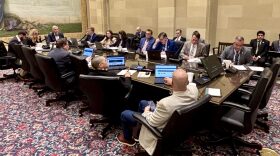Epic Charter Schools has provided emails from co-founder Ben Harris requested by Oklahoma Watch in 2020 after settling a lawsuit.
Oklahoma Watch, represented by attorney Kathryn Gardner and the Reporters Committee for Freedom of the Press, filed the lawsuit in May 2021 alleging the virtual charter school effectively denied an open records request for the emails by charging illegal fees.
The virtual charter school refused to provide emails first requested by reporter Jennifer Palmer in July 2020 unless Oklahoma Watch paid for paper copies and “legal review” fees amounting to more than $40,000. Palmer then narrowed her request for emails to and from Harris over two months in the summer of 2020. Epic’s attorneys said the request would cost $4,800.
Epic quoted “legal review” fees of $85 per hour that it said were allowed under a policy by the state Department of Education. The school’s attorneys said the review was needed to examine each email for possible confidential student or health information. The school never explained how its co-founder, who wasn’t employed by the school but received money through the charter school’s management company, would encounter such information in his emails.
At the time of the records request, Harris was still involved in the school and frequently attended its board meetings. Epic was facing multiple investigations into its spending and its expenses with Epic Youth Services, the management company run by Harris and David Chaney.
Under the settlement, Epic provided Palmer and Oklahoma Watch with the emails at no cost. Each side is responsible for its attorney fees. Gardner and the Reporters Committee for Freedom of the Press represented Oklahoma Watch on a pro bono basis.
Ted Streuli, executive director of Oklahoma Watch, said it was clear the emails were public records under the law. He said the records belong to the public, and agencies should make records readily and easily accessible to anyone who wants to see them.
“It was going to cost a lot of money to fight this, and they were likely to lose in the end because the law is pretty clear on this,” Streuli said. “They agreed to give us the records we asked for many months ago. I think it’s fair to say they would have saved a lot of money if they initially complied with the law when we made the request.”
Epic began replacing its governing board members at the end of 2020 and has since completed a full turnover. Board chair Paul Campbell was brought on in May 2021, and his first action as board chair was to cut ties with founders Harris and Chaney and their private, for-profit management company. The school doesn’t contract with a management company and is led by Superintendent Bart Banfield.
In a statement, Banfield said Epic continues to realign internal policies under its new leadership.
“We appreciate the dismissal of the lawsuit and recognize the patience of the public and members of the media as Epic Charter Schools continues to realign its internal procedures under new executive leadership and a new Board of Education,” Banfield said in the statement. “We recognize the importance in supplying the requested documents, and in good faith, applied the necessary internal resources and budget to share the data in an accessible format.”
Palmer said she was happy to see the lawsuit settled.
“Serving as a watchdog for the public is the most rewarding part of this job, and I’m grateful for all the support I’ve received from Oklahoma Watch, the Reporters Committee for Freedom of the Press and our readers to pursue these records,” Palmer said.
Although the state’s open records law doesn’t require review of records by licensed attorneys, more public bodies are funneling records requests through their attorneys. State law requires records to be available for inspection or copying during normal business hours. Any redactions of private or confidential information can usually be done by records custodians, clerks or paralegals. Streuli said involving agency attorneys for each step slows down the process.
“If they’re handing records off to attorneys before the public sees them, they’re incurring costs the taxpayer has to bear for no real purpose,” Streuli said. “The public owns the records. Agencies sometimes get the idea that they’re in their own little kingdom and it all belongs to them. It doesn’t. It belongs to the taxpayers who are funding the agency or funding the school district in the first place. They’re merely the keepers of those records, not the owners.
“This was an expensive and foolhardy decision by Epic to deny our request,” Streuli said.
Gardner, with the Reporters Committee for Freedom of the Press, said using an outside law firm could also put extra expenses onto taxpayers.
“In the case of Epic and many others I can think of around Oklahoma, these fees are then going to law firms on a per-hour basis,” Gardner said. “And there’s really no meaningful control over what those fees could be.”
Oklahoma Watch, at oklahomawatch.org, is a nonprofit, nonpartisan news organization that covers public-policy issues facing the state.







